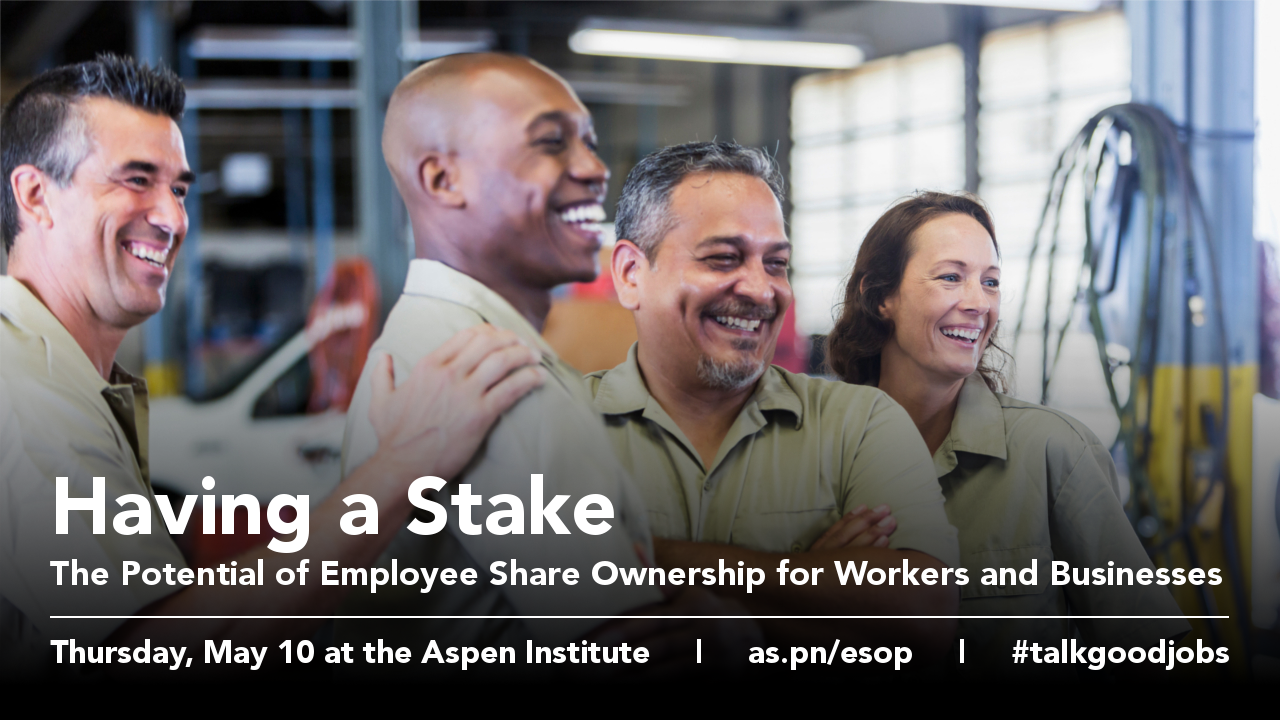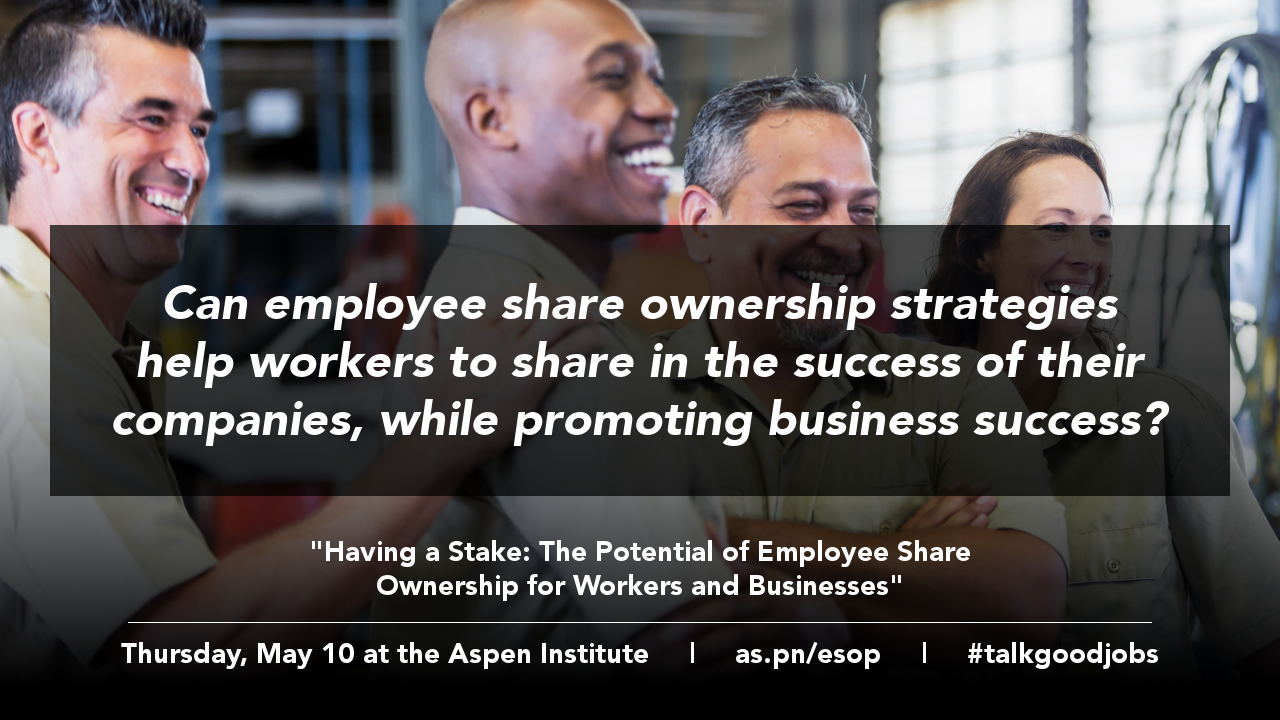Having a Stake: The Potential of Employee Share Ownership for Workers and Businesses
About this event
In recent decades, workers’ paychecks have remained stagnant, despite increases in productivity. At the same time, returns to wealth have increased. Strategies that transform workers into owners, such as employee share ownership strategies, have the potential to give working people a stake in our growing economy and include them in the nation’s prosperity. With employee share ownership strategies, employees may hold a majority of shares as participants in an Employee Stock Ownership Plan (ESOP), be members of a worker cooperative, or have a meaningful stake in a public company or start-up. Business leaders often emphasize the value of employee engagement, and many have found that these strategies contribute to higher levels of worker engagement, relative to that of peer companies. Can employee share ownership strategies help workers to share in the success of their companies, while promoting business success?
At this event, we hear about companies that have used employee share ownership models successfully, as well as policymakers who are exploring strategies to support and advance employee share ownership opportunities. This event was jointly hosted by the Economic Opportunities Program and the Financial Security Program.
Featured resource
Opening speakers
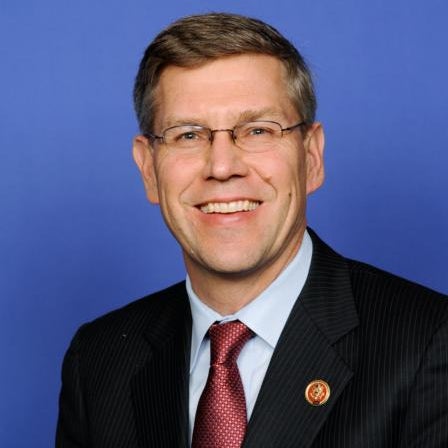
Congressman Erik Paulsen @RepErikPaulsen
US Representative for Minnesota’s Third Congressional District
In January 2017, Congressman Erik Paulsen was sworn in to serve his fifth term representing Minnesota’s Third Congressional District. Congressman Paulsen’s legislative agenda parallels the initiatives that make Minnesota a great place to live, work, and raise a family: a strong economic climate for job growth, a fairly funded and accountable education system, a well-preserved environment, safe communities, and tax reform for taxpayers and businesses.
Congressman Paulsen is a member of the Ways & Means Committee, which has jurisdiction over health care, economic, and trade policy and is the chief tax writing committee in the House of Representatives. He supports pro-growth initiatives and believes that open markets are the key to a strong economy. Congressman Paulsen is also a member of the Joint Economic Committee, a bicameral Congressional Committee composed of ten members from the US Senate and the US House of Representatives, which studies and performs research on matters relating to the US economy and advises Congress on how to best spur economic growth and create jobs. Congressman Paulsen brings real-world experience to Capitol Hill with over 16 years of business experience, including working as a business analyst at Target Corporation.
Before being elected to Congress in 2008, Congressman Paulsen represented Minnesotans for 14 years in the State Legislature where he served as House Majority Leader from 2003 to 2007. He received his B.A. in mathematics from St. Olaf College and resides in Eden Prairie with his wife and their four daughters.

Joseph Blasi @JosephBlasi
Senior Fellow, Aspen Institute Economic Opportunities Program
Director, Institute for the Study of Employee Ownership and Profit Sharing at Rutgers University
J. Robert Beyster Distinguished Professor, Rutgers University’s School of Management and Labor Relations @RU_SMLR
Joseph Blasi is a senior fellow of the Aspen Institute Economic Opportunities Program. He is the J. Robert Beyster Distinguished Professor at Rutgers University’s School of Management and Labor Relations and Director of the Institute for the Study of Employee Ownership and Profit Sharing at Rutgers, a network of more than a hundred scholars in most states researching these issues. He is an expert on broad-based equity participation and profit sharing plans for employees with a special interest in how shares work in emerging tech and innovation companies. He is author of The Citizen’s Share (Yale University Press, 2013), an American history of shares and share policies and “Having a Stake,” a policy report by the ThirdWay.org policy think tank in Washington, DC. He is frequently called upon to advise policy-makers in the executive and legislative branches at the federal and state level. He is a research associate of the National Bureau for Economic Research. He has a BS in Social Psychology from the University of Pittsburgh and an Ed.D. from Harvard University.
Featured speakers

Amy Hall @EFAmyHall
Vice President, Social Consciousness, EILEEN FISHER @EILEENFISHERNY
Amy serves in the new role of Vice President, Social Consciousness for women’s clothing designer EILEEN FISHER. In this capacity, she guides the company toward greater alignment with its Benefit/B Corporation status and Quadruple Bottom Line framework. Amy collaborates internally and externally to position the company at the leading edge of human, environmental, and economic sustainability. Amy came to EILEEN FISHER in 1993, following a fundraising career with Asian-American cultural, educational, and social service organizations in New York City. Her educational background includes a bachelor’s degree from Georgetown University, a master’s from Teachers College-Columbia University, and a sustainable MBA from Green Mountain College. Amy currently chairs the advisory board of Social Accountability International, serves on the board of Made-By, and represents the company on the Development Council of Future Fit. She is also a frequent guest speaker on CSR and Sustainability-related topics. An avid cyclist with a self-built bamboo bike, Amy will ride in her second Climate Ride — this time in Nova Scotia — in September.

Markita Madden-Puckett
Customer Service Representative, ComSonics, Inc. @ComSonics
Markita is a Harrisonburg, Virginia native and James Madison University alumna. She has been with ComSonics since February 2001 as a customer service representative. ComSonics has had an Employee Stock Ownership Plan since 1975, becoming 100 percent employee-owned in 1985. During Markita’s career here, she has also had the privilege of serving on and then chairing the company’s Employee Advisory Committee. The EAC is the communications committee which holds responsibility for communicating “all things ESOP” to the employee-owners at ComSonics. This role also afforded Markita the opportunity of serving on the company board for seven years, navigating the committee through the retirement of a long-term employee and CEO and the transition to new company leadership. Markita was the 2013 National ESOP Association’s Employee-Owner of the Year and continues to share her passion for the special culture that exists in employee-owned companies whenever opportunities arise.
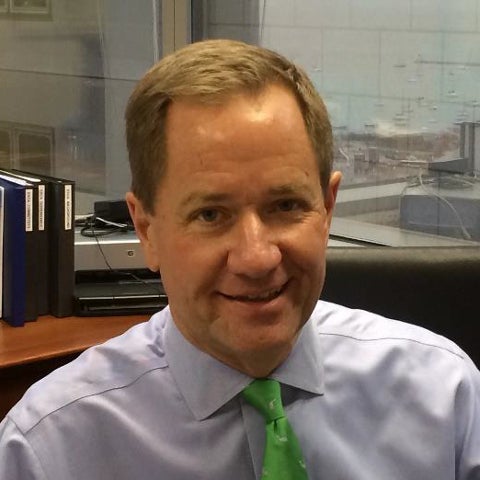
Stephen R. Smith
President & CEO, AMSTED Industries
Stephen Smith is President and Chief Executive Officer at AMSTED Industries. Stephen joined AMSTED in 2005 as president of Amsted Rail, became general counsel in 2007, and was appointed President and Chief Executive Officer in 2017. He is a member of the Board of Directors of Employee-Owned S Corporations of America (ESCA) — the leading voice for employee-owned corporations — and served as its Chair from 2015 to 2017. Prior to joining AMSTED, Stephen was general counsel and president of the shared services operations in North America of GKN plc, a FTSE-traded UK diversified engineering company. He earned an A.B. in political science from Wheaton College (Illinois) and his J.D. from The University of Chicago Law School. Mr. Smith serves as Board Chair of the Grant Park Orchestral Association. He is a past member of the Wheaton College Board of Visitors and the Visiting Committee of The University of Chicago Law School.
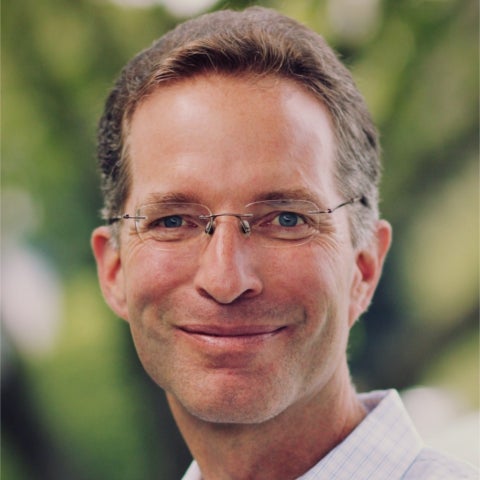
Steven Voigt
Retired President & CEO, King Arthur Flour @kingarthurflour
Steven Voigt was President and CEO of King Arthur Flour® from 1999 to 2014. Hired in 1992 as Vice President of Finance, Steve became the Chief Operating Officer in 1998. Prior to King Arthur Flour®, Steve worked for Benedetto, Gartland & Greene in New York, where he raised private equity for venture, LBO, and alternative asset funds. During his tenure there, Steve also supported his wife in founding, and later selling, Robin’s Homemade Breads of Greenwich, CT. He also consulted out of Zurich, Switzerland and Cleveland for McKinsey & Company. Steve is a graduate of the Amos Tuck School of Business Administration at Dartmouth College and Colgate University. Steve serves on the boards of Newport Harbor Corporation, Vermont Mutual Insurance Company, Dansko, Montshire Museum of Science, Maine Grains, and Tuck’s Center for Business, Government & Society. He has also been an active member of The ESOP Association, serving on the Board of Governors from 2003-2009 and as its Chair. King Arthur Flour was named Employee Owned Company of the Year in 2016.
Moderator
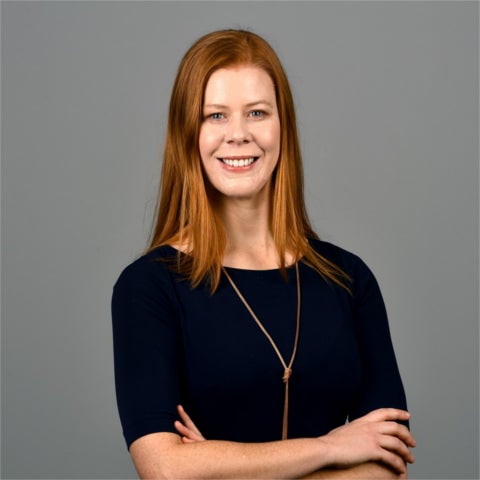
Heather Long @byHeatherLong
Economics Correspondent, The Washington Post @WashingtonPost
Heather Long is an economics correspondent with The Washington Post. Before joining The Washington Post’s Wonkblog, she was a senior economics reporter at CNN and a columnist and deputy editor at the Patriot-News in Harrisburg, Pennsylvania. She holds master’s degrees in medieval literature and financial economics from Oxford University, where she was a Rhodes Scholar.
Share now
Tweet Can employee share ownership strategies help workers to share in the success of their companies, while promoting business success?
Tweet Strategies that transform workers into owners can give them a stake in our growing economy and include them in the nation’s prosperity.
Tweet While profits and productivity have grown, workers’ paychecks have remained stagnant. Turning employees into owners could help correct this trend.
Images
Learn more
This event is part of the Working in America series, an ongoing discussion series hosted by the Aspen Institute Economic Opportunities Program that highlights an array of critical issues affecting low- and moderate-income workers in the United States and ideas for improving and expanding economic opportunities for working people. For more information, visit as.pn/workinginamerica.
The Economic Opportunities Program (EOP) advances promising strategies, policies, and ideas to help low- and moderate-income Americans connect to and thrive in a changing economy. Over its 25 years of work, EOP has developed particular expertise in workforce training and education, microenterprise development and business ownership, financial services and asset building, and business practices that support quality jobs. EOP works to drive change by conducting evaluation and applied research to learn about effective practice in diverse contexts; facilitating leadership development and capacity-building initiatives that reach a broad network of local leaders; hosting cross-sector dialogue on key issues of economic security and opportunity; and producing public and private convenings and written products to share insights and engage broad audiences in the challenge of expanding economic opportunity in America.
The Aspen Institute Financial Security Program leverages human insights and entrepreneurial thinking to find policies, products, and services that deliver greater financial security for millions of Americans. We’re connecting the world’s best minds to find breakthrough solutions for America’s family financial security crisis. Through strategic convenings and dialogues, we provide a dedicated forum where experts in policy and banking work closely with academic and community leaders to strengthen the financial stability of American families.
Tweet with us
Join the conversation on Twitter by following @AspenWorkforce, @AspenMicro, and @AspenFSP and tweeting with the hashtag #talkgoodjobs.
Tweets by AspenWorkforce Tweets by AspenMicro Tweets by AspenFSP
